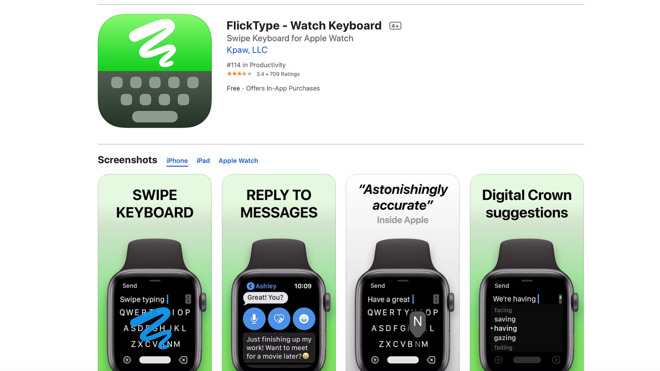Fake App Store reviews spark developer outrage, highlighting need for enforcement
An established indie developer has highlighted an all-too-common practice of scam apps gaming the App Store's review system, and is trying to pressure Apple to enforce its developer policies better.

An established indie developer has highlighted the App Store's fake-review problem
In an ongoing Twitter thread highlighted by TechCrunch, Kosta Eleftheriou, creator of the FlickType Apple Watch keyboard, has vented frustration about App Store enforcement. He relays his arduous process of trying to fend off scam applications that claim to do what his app does.
These competing apps sometimes steal his promo videos to post on Facebook. At the same time, the apps in question are charging exorbitant subscription fees and falling well short of advertised features -- or not working at all.
Eleftheriou's frustration is not only with the scam apps but with Apple's lack of review enforcement. The developer highlights numerous five-star ratings for the scam apps, responding with general platitudes or copied-and-pasted info from other products.
These fake reviews nearly cancel out the authentic negative ones, allowing the scams to maintain a high average rating despite empty promises, stolen IP, and increased costs.
He believes that if Apple enforced its review guidelines, authentic user feedback would highlight the scams, warning other users against wasting their money. The lack of consistent enforcement allows the clone apps to stay afloat, maintaining a veneer of credibility.
Many fake reviews reveal their lack of authenticity by referring to non-existent features, suggesting someone had copied and pasted them from another product. For example, one review for a knockoff keyboard app gushed about using control-alt-delete to summon Windows task manager.

App Store listing for FlickType, the oft-copied indie app that sparked the debate
Apple's developer rules forbid submitting fraudulent reviews. As a violation of the developer program's licensing agreement, these clone apps risk having Apple remove their apps or revoke their developer licenses.
However, Eleftheriou ran into dead ends trying to flag the situation through Apple's dispute channels.
"They put you in contact with the other developer in question, and oversee the thread while they hope you will resolve the issue with the other party directly," he told TechCrunch. "The scammers I complained about in that dispute weren't even the bigger scammers I mention in my Twitter thread. Yet, the complaint I had with them barely got addressed, and there was no response from Apple whatsoever on the issue of the fake ratings and reviews."
"Simply an 'if we don't hear back from you very soon, we consider the matter resolved,'" Eleftheriou added. "We even reached out to Apple privately after that but got no response."
"What was most impressive to me was that in the presence of the Apple legal team, the scammers did not feel threatened one bit -- almost as if they know Apple is unlikely to do anything," he said. "In my view, Apple simply does not devote enough resources on this area."
After Eleftheriou's Twitter thread gained traction, Apple responded by pulling some of the apps he had complained about. However, their developer accounts were still active, and the perpetrators continue to profit off scam apps in other categories.
"It's astounding that even pulling a scam like that doesn't get your developer account revoked," Eleftheriou said. "I mean, if that didn't do it, what would??"
Various companies sell fake reviews, courting app developers with promises of boosting their scores. They claim their services will avoid removal from Apple.
Fake reviews are a mainstay of the modern internet, prevalent not only on the App Store but on Amazon, other online retailers, and Google Play. While policing them would be a large investment and a taxing undertaking, some enforcement is needed to maintain trust and avoid situations like Eleftheriou's.
Given the premium expectations that go along with Apple's brand, many hold it to a higher standard than companies like Amazon, Facebook, and Google, where fake reviews and other scam content can thrive.
"The promise of ratings and reviews you can trust does not exist anymore," Eleftheriou says, "which erodes consumer trust at an ever-accelerating pace."

An established indie developer has highlighted the App Store's fake-review problem
In an ongoing Twitter thread highlighted by TechCrunch, Kosta Eleftheriou, creator of the FlickType Apple Watch keyboard, has vented frustration about App Store enforcement. He relays his arduous process of trying to fend off scam applications that claim to do what his app does.
These competing apps sometimes steal his promo videos to post on Facebook. At the same time, the apps in question are charging exorbitant subscription fees and falling well short of advertised features -- or not working at all.
Eleftheriou's frustration is not only with the scam apps but with Apple's lack of review enforcement. The developer highlights numerous five-star ratings for the scam apps, responding with general platitudes or copied-and-pasted info from other products.
These fake reviews nearly cancel out the authentic negative ones, allowing the scams to maintain a high average rating despite empty promises, stolen IP, and increased costs.
He believes that if Apple enforced its review guidelines, authentic user feedback would highlight the scams, warning other users against wasting their money. The lack of consistent enforcement allows the clone apps to stay afloat, maintaining a veneer of credibility.
Many fake reviews reveal their lack of authenticity by referring to non-existent features, suggesting someone had copied and pasted them from another product. For example, one review for a knockoff keyboard app gushed about using control-alt-delete to summon Windows task manager.

App Store listing for FlickType, the oft-copied indie app that sparked the debate
Apple's developer rules forbid submitting fraudulent reviews. As a violation of the developer program's licensing agreement, these clone apps risk having Apple remove their apps or revoke their developer licenses.
However, Eleftheriou ran into dead ends trying to flag the situation through Apple's dispute channels.
"They put you in contact with the other developer in question, and oversee the thread while they hope you will resolve the issue with the other party directly," he told TechCrunch. "The scammers I complained about in that dispute weren't even the bigger scammers I mention in my Twitter thread. Yet, the complaint I had with them barely got addressed, and there was no response from Apple whatsoever on the issue of the fake ratings and reviews."
"Simply an 'if we don't hear back from you very soon, we consider the matter resolved,'" Eleftheriou added. "We even reached out to Apple privately after that but got no response."
"What was most impressive to me was that in the presence of the Apple legal team, the scammers did not feel threatened one bit -- almost as if they know Apple is unlikely to do anything," he said. "In my view, Apple simply does not devote enough resources on this area."
After Eleftheriou's Twitter thread gained traction, Apple responded by pulling some of the apps he had complained about. However, their developer accounts were still active, and the perpetrators continue to profit off scam apps in other categories.
"It's astounding that even pulling a scam like that doesn't get your developer account revoked," Eleftheriou said. "I mean, if that didn't do it, what would??"
Various companies sell fake reviews, courting app developers with promises of boosting their scores. They claim their services will avoid removal from Apple.
Fake reviews are a mainstay of the modern internet, prevalent not only on the App Store but on Amazon, other online retailers, and Google Play. While policing them would be a large investment and a taxing undertaking, some enforcement is needed to maintain trust and avoid situations like Eleftheriou's.
Given the premium expectations that go along with Apple's brand, many hold it to a higher standard than companies like Amazon, Facebook, and Google, where fake reviews and other scam content can thrive.
"The promise of ratings and reviews you can trust does not exist anymore," Eleftheriou says, "which erodes consumer trust at an ever-accelerating pace."

Comments
These are not competing apps. These are non-functional apps that use a combination of IP theft to look like competitors (outright theft of images and videos that are by default copyrighted in the US) and fake reviews to boost the perception of user satisfaction, in order to dupe Apple's App Store customers into paying money for nothing. Adobe can afford to play whack-a-mole with these issues without needing Apple's help, but the small-shop and single-member LLC/sole-proprietor developers rely on Apple caring about all of its customers enough to enforce some semblance of legitimacy, something they are resoundingly failing at right now.
Hang on, let me get out my tiny violin. Apple created this system. They make monstrous money from it. They can afford to do it correctly.
If companies like Apple and Amazon can only be “profitable” by running “marketplaces” rife with scam products and fake reviews, then they need to be compelled by law to stop.
Apple has the money to hire the workforce to manage their own damned app stores. Amazon was massively profitable BEFORE becoming a festering pit of third-party sellers. It’s all about greed and an utter unwillingness to use some of their income on MANAGING their own systems.
As others have said above, the garbage apps and fake reviews stop me from perusing the app stores (and the number of garbage sellers on Amazon cause me to look elsewhere for the products I need). Apple doesn’t even have reporting tools for bad app listings (Amazon will delete your reviews if you post one warning other potential buyers of fake products like “FireWire to USB adapters”, which are fake and should never be used).
Companies with too much money and no interest in maintenance of their own systems and stores DO LOSE customers as a result of bad management... but they don’t lose enough of them. Buyers can’t stop these abusive systems because they have no power. The sheer vastness of their profits lets these companies be complacent and passive in the face of so much fraud & abuse. It wouldn’t shock me to find that both companies have “done the math” and decided that a cesspool marketplace is more profitable than a well-managed marketplace. Such a choice shouldn’t even be allowed by our economic system, but we have far too many people believing in the myth of the free market, and treating laissez-faire capitalism like a religion, inseparable from “being American”.
But not all issues are up to Apple to solve. If an app steals your promo and puts it on their facebook page - Apple can't fix that, and it's problematic for Apple to step into the personal disagreements between two developers.
Apple needs to tighten App Store policing in many areas, the quality of Apps is becoming atrocious.
Maybe it's better than a total Wild West, but it's a long way from an A grade. B- at best.